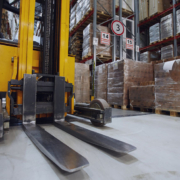Real-time locationing has proven vital for almost every industry’s modernization plan. With 41% of shoppers citing shortages as the top obstacle keeping them from finalizing a purchase, distributors are turning to modernized inventory management solutions leveraging RFID to monitor shortages and predict demand. As major retailers like Walmart and Nordstrom demand RFID tracking for many everyday items, manufacturers and distribution centers cannot waste time on inefficient tracking systems.
Is RFID Right for You?
Not every business requires RFID tracking to establish dependable visibility. Consequently, before you investigate an RFID solution, experts recommend evaluating several components such as:
- Environmental challenges
High ceilings, metal racks and thick walls are just a few environmental challenges hindering RFID transformation. Unique locations such as cold storage or manufacturing facilities require durable technologies to withstand around-the-clock usage and extreme temperatures.
With a better grasp of the environmental challenges, technicians can recommend durable devices such as Zebra’s rugged fixed readers and handheld RFID scanners to ensure flawless scans anywhere in the facility.
- Current wave frequencies
Furthermore, assessing environmental challenges can also reveal potential interference from current technologies. Two-way radios, WiFi, and Bluetooth create interfering wavelengths. If left unchecked, interference can prevent data from reaching your teams on time, creating blind spots within your operations.
Depending on your workflow requirements, a different tracking system may be more compatible with your location to accommodate current technologies. Understanding your systems may also help evaluate if a passive or active RFID system is more beneficial.
- Type of inventory being tagged
Certain types of surfaces may be harder to tag, such as curved or metal objects. These can create more wave distortion, hindering successful reads. Fortunately, technological advancements are now bridging the gap between metal inventory and RFID tags.
New RFID on-metal tagging solutions empower manufacturers to track tools, fixtures and other metal parts without hindering read performance. Designed to print thicker tags, the ZT411 can deliver RFID encoded tags fit for metal surfaces through one user-friendly, industrial-grade device while also providing traditional RFID tags and barcodes for vital workflows.
- Estimated training time
Employees must become familiar with new devices, workflows, software and applications. The faster they learn, the less likely they will commit costly mistakes. Therefore, systems should employ easy-to-use technologies to lower training times.
While every new solution presents a learning curve, user-friendly operating systems like Android for Enterprise can help minimize training by consolidating workflows onto a familiar touchscreen interface. Moreover, Android’s open app ecosystem facilitates future app integration. Seamless integration ultimately preserves your solution’s scalability in the long run.
- Future configurations and updates
Current supply chain challenges are prime examples of how unforeseen changes can radically alter entire industries. That’s why scalability and flexibility should be ensured from the very beginning when possible. When you work alongside an experienced RFID solution provider, your operation can draw from their experience and prior successful implementations to create an adaptable plan that embraces future changes.
Once these factors are covered, businesses should have a better scope of their RFID implementation process.
Selecting a Viable Solution Provider
Whether you’re using an existing solution provider or evaluating a new one, you should understand that RFID implementations require an experienced, hands-on approach. Industry experts recommend evaluating current or future solution providers to make sure they offer:
- Complete scalability of your whole system (not just hardware)
- Software installation and reconfiguration
- Long-term technical support
- Rapid label development and delivery
There are numerous processes and workflows to evaluate when considering an RFID system for your operation. For more information or location analysis, schedule a preliminary evaluation with one of our RFID specialists.











